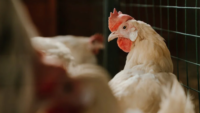Food Safety Advocacy Groups Support USDA-FSIS Proposal to Declare Salmonella an Adulterant in Certain Chicken Products

Image credit: Shameel mukkath via Pexels
The Center for Science in the Public Interest (CSPI) and other food safety advocates have announced their support of a proposal by the U.S. Department of Agriculture’s Food Safety and Inspection Service (USDA’s FSIS) to declare Salmonella an adulterant in breaded, stuffed, not-ready-to-eat (NRTE) chicken products. Besides CSPI, signatories to the comment filed with USDA include representatives of the Center for Foodborne Illness Research and Prevention at Ohio State University, Consumer Federation of America, Consumer Reports, Stop Foodborne Illness, and William (Bill) Marler, Esq.
The NRTE products in question, such as Chicken Cordon Bleu and Chicken Kiev, are typically frozen, and have been disproportionately associated with cases of salmonellosis. Because these products often come pre-browned and may appear cooked when they are not, consumers often do not understand the raw nature of the products and may use improper techniques for cooking. Although such products account for only 0.15 percent of domestic chicken products, they have been linked to five percent of all chicken-related Salmonella outbreaks.
In 2021, members of the aforementioned groups petitioned USDA to reform its poultry Salmonella regulations due to lack of progress in reducing human illnesses. The petition asked for enforceable final product standards that would disallow the sale of products with concerning types of Salmonella contamination, whether that be determined by the presence of specific Salmonella subtypes and/or the amount of Salmonella present in a product. The petition argued that final product standards would better motivate industry to control the most dangerous types of contamination and prevent products that are known to be particularly hazardous from reaching consumers.
USDA’s April 2023 proposed rule would consider Salmonella to be an adulterant in NRTE, breaded, stuffed chicken products under federal law when the bacteria is present at more than 1 colony forming unit per gram (CFU/g) of the product. The proposal is part of a broader effort by the agency to reduce Salmonella illnesses linked to poultry.
In comments submitted to USDA regarding its proposal, CSPI and the other consumer advocates wrote that they support the threshold of 1 CFU/g, which they believe should be effective in preventing a substantial proportion of illnesses related to the products in question. CSPI states that the proposed Salmonella product standard would reduce the burden on home cooks to control the pathogen, although proper cooking techniques should not be neglected.
Additionally, the groups explained their support for FSIS’ determination that Salmonella is an “added substance,” as the agency has traditionally viewed Salmonella as “naturally occurring” in food animals. Classifying Salmonella as an “added substance” or “naturally occurring” is important in determining when a product is “adulterated” under federal law requiring a higher likelihood of harm for substances that are “not an added substance” (i.e., “naturally occurring”), than for added substances. Specifically, whereas a poultry product may be considered adulterated if “it bears or contains any poisonous or deleterious substance which may render it injurious to health,” in the case of a naturally occurring substance, the standard requires that the “quantity of such substance” must “ordinarily render it injurious to health.”
The groups also support FSIS in its statement that it will continue to evaluate and refine its proposed determination as necessary, based on advances in science and technology related to pathogen levels, serotypes, and infectious dose. For example, with testing technology that allows for rapid serotyping and whole genome sequencing (WGS), it may become possible to pinpoint the most virulent and infectious serotypes or genetic variants of Salmonella, allowing FSIS to develop more stringent standards for specific types. If it is found in the coming years that a specific Salmonella subtype causes illnesses at a lower dose and is especially prevalent in chicken products, there may be a need to adjust standards.
Looking for a reprint of this article?
From high-res PDFs to custom plaques, order your copy today!





